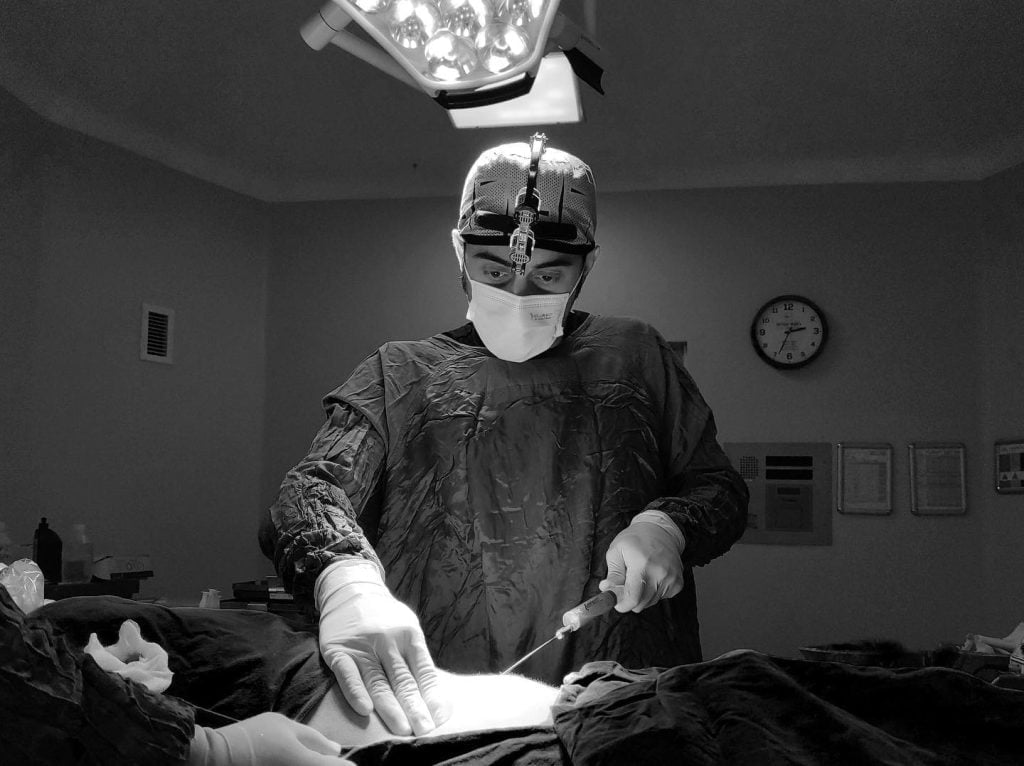Undergoing Facial Feminization Surgery (FFS) is a major decision, one that carries immense hope and the potential for profound positive change. Your choice of surgeon is arguably the single most important factor in ensuring a safe, successful, and genuinely affirming FFS experience. But with numerous surgeons offering FFS, how do you choose a trustworthy FFS surgeon – one you can confidently place your face, your well-being, and your dreams in?
This article is your essential guide to choosing a trustworthy FFS surgeon. We’ll break down the key qualities, qualifications, and steps to take to identify a surgeon who not only possesses the surgical skills but also embodies the ethical practice, transparency, and patient-centered approach that builds true trust. Your journey to facial feminization deserves to be in the safest and most capable hands.

Table of Contents
Why Trustworthiness is Paramount When Choosing an FFS Surgeon
Trust in your FFS surgeon is not just a desirable quality – it’s absolutely essential. This is not merely a cosmetic procedure; FFS is intricate, often involving multiple delicate procedures, impacting your facial identity and long-term well-being. Here’s why trustworthiness should be your non-negotiable priority:
- Complex and Delicate Surgery: FFS involves intricate reshaping of bone and soft tissues in highly sensitive areas. Trustworthiness implies a surgeon with proven skill, meticulous technique, and a deep understanding of facial anatomy and feminization goals.
- Emotional Vulnerability: You are entrusting your face – your outward representation of self – to a surgeon. This creates a significant level of emotional vulnerability. Trustworthiness means a surgeon who respects this vulnerability, provides compassionate care, and prioritizes your emotional well-being alongside physical outcomes.
- Significant Financial and Time Investment: FFS represents a substantial investment of both finances and time (including recovery). A trustworthy surgeon is transparent about costs, provides realistic expectations regarding outcomes and recovery, and values your investment.
- Long-Term Impact on Well-being: The results of FFS are intended to be long-lasting and to positively impact your gender congruence and overall quality of life. Trustworthiness means a surgeon committed to achieving outcomes that are not only aesthetically pleasing but also contribute to your long-term happiness and well-being.
- Patient Safety is the Foundation of Trust: Above all, trustworthiness is rooted in a surgeon’s unwavering commitment to patient safety. This includes rigorous training, ethical practice, adherence to safety protocols, and open communication about potential risks and complications.

Key Pillars of a Trustworthy FFS Surgeon: Building Your Confidence
What are the specific qualities and indicators that point to a trustworthy FFS surgeon? Look for these key pillars when evaluating your options:
1. Impeccable Qualifications and Board Certification: Verifiable Expertise
- Board Certification in Relevant Specialties: Prioritize surgeons who are board-certified in relevant surgical specialties. In Australia, this typically means Plastic Surgery (FRACS – Plast) through the Royal Australasian College of Surgeons, or Oral and Maxillofacial Surgery (FRACDS(OMS)) through the Royal Australasian College of Dental Surgeons. Board certification signifies rigorous training, demonstrated competence, and adherence to professional standards. Verification of board certification is crucial – do not just take a surgeon’s word for it. Check with the relevant college or medical board.
- Specialized Training in FFS: Beyond core surgical training, look for evidence of further specialized training or fellowships specifically in Facial Feminization Surgery or craniofacial surgery. This demonstrates a focused commitment to the nuances and complexities of FFS.
- Academic Affiliations and Recognition (Optional but Positive): While not mandatory, affiliations with reputable hospitals or universities, publications in peer-reviewed journals, or presentations at medical conferences can be positive indicators of a surgeon’s dedication to their field and staying at the forefront of medical advancements.
2. Extensive Experience and Specialization in FFS: Volume Matters
- Focus on FFS as a Significant Part of their Practice: Ideally, choose a surgeon for whom FFS is not just an occasional procedure, but a significant and focused part of their surgical practice. Surgeons who perform FFS frequently are more likely to have refined techniques and a deep understanding of achieving feminizing outcomes.
- Years of Experience Performing FFS: Inquire about the surgeon’s years of experience specifically in FFS. More years of dedicated FFS practice generally equate to a greater depth of skill and experience.
- High Case Volume: Ask about their approximate case volume of FFS procedures performed. Higher volume surgeons are typically more practiced in a wide range of FFS procedures and can handle diverse anatomical variations.
3. Ethical Practice and Transparency: Openness and Honesty
- Thorough Informed Consent Process: A trustworthy surgeon will prioritize informed consent. They will explain the planned procedures in detail, clearly outline potential risks and complications, discuss realistic outcomes and limitations, and ensure you fully understand before proceeding. They will not pressure you or rush the consent process.
- Realistic Expectations and Honest Communication: A trustworthy surgeon will provide honest assessments of what FFS can realistically achieve for you. They will not make exaggerated promises or guarantee specific outcomes. They will openly discuss limitations and potential trade-offs.
- Openness About Risks and Complications: Transparency about potential risks and complications is a hallmark of ethical practice. A trustworthy surgeon will proactively discuss these, not downplay or avoid them. They will also explain their strategies for risk minimization and complication management.
- Patient-Centered Approach: A trustworthy surgeon prioritizes your individual needs, goals, and well-being above all else. They listen attentively to your concerns, answer your questions thoroughly, and tailor their approach to your unique circumstances.
4. Positive Patient Experiences and Reputation: What Others Say (with Caution)
- Review Patient Testimonials and Before & After Photos: Examine patient testimonials and before-and-after photos on the surgeon’s website or reputable online platforms. While results visible online are often carefully selected, they can provide some indication of the surgeon’s aesthetic style and patient satisfaction. Be mindful that online reviews can be curated.
- Seek Out Independent Reviews and Forums (with Discernment): Look for reviews on independent medical review sites or transgender community forums. However, approach online reviews with discernment. Individual experiences are subjective, and online reviews can be biased. Look for patterns in feedback rather than focusing on isolated anecdotes.
- Word-of-Mouth Referrals (If Possible): If you know others who have undergone FFS, especially if they have similar facial features or feminization goals, ask about their surgeon recommendations and experiences. Personal referrals can be valuable, but remember that what works for one person may not be ideal for another.
5. Clear and Compassionate Communication: Building Rapport
- Responsive and Accessible: A trustworthy surgeon and their team will be responsive to your inquiries and accessible for communication throughout the consultation and pre-operative process. Prompt and clear communication is a sign of respect for your time and concerns.
- Patient and Empathetic Consultation Style: During consultations, observe the surgeon’s communication style. Are they patient, empathetic, and do they take the time to listen to you and address your questions fully? Do you feel respected and understood?
- Clear and Understandable Explanations: A trustworthy surgeon will explain complex medical information in a clear, understandable way, avoiding jargon and ensuring you comprehend all aspects of your planned surgery.
- Willingness to Answer Questions Thoroughly: A trustworthy surgeon welcomes your questions and answers them honestly and thoroughly. They will not be dismissive or impatient with your inquiries.
6. Accredited Surgical Facilities and Safety Protocols: Prioritizing Your Well-being
- Surgery Performed in Accredited Hospitals or Surgical Centres: Ensure the surgeon performs surgeries in properly accredited hospitals or surgical centers. Accreditation signifies adherence to rigorous safety standards, infection control protocols, and quality of care. In Australia, look for facilities accredited by organizations like the Australian Council on Healthcare Standards (ACHS).
- Emphasis on Patient Safety Protocols: Inquire about the surgeon’s and facility’s patient safety protocols and emergency preparedness. A trustworthy surgeon places patient safety at the forefront of their practice.
- Experienced Anesthesia Team: Confirm that surgery is performed with a qualified and experienced anesthesia team. Anesthesia safety is a crucial aspect of surgical procedures.
Actionable Steps to Verify Trustworthiness: Your Due Diligence Checklist
Now, let’s translate these pillars into actionable steps you can take to verify the trustworthiness of a potential FFS surgeon:
- Verify Board Certification:Crucially – do not just accept a surgeon’s claim of board certification. Independently verify their board certification status.
- For Plastic Surgeons in Australia: Check the website of the Royal Australasian College of Surgeons (RACS) and the Australian Health Practitioner Regulation Agency (AHPRA) register to confirm FRACS (Plast) status and specialist registration .
- For Oral and Maxillofacial Surgeons: Check the Royal Australasian College of Dental Surgeons (RACDS) for FRACDS(OMS) status and AHPRA registration.
- Thoroughly Review Surgeon’s Website and Credentials: Examine the surgeon’s website for detailed information about their qualifications, training, experience specifically in FFS, and their surgical philosophy. Pay close attention to their “About Me” or “Credentials” sections.
- Request Before & After Photos (and Understand Limitations): Ask to see before-and-after photos of the surgeon’s FFS patients, ideally those with similar presenting facial features to your own. Understand that these photos are often curated and represent ideal results. Focus on assessing the quality and naturalness of the feminization achieved, rather than expecting identical results for yourself.
- Read Patient Reviews (But Cautiously and Across Multiple Sources): Search for patient reviews on reputable medical review sites, transgender forums, and potentially the surgeon’s own website (but prioritize independent sources). Look for consistent themes – both positive and potentially negative (if any). Don’t rely on a single review; look for patterns.
- Schedule Multiple Consultations with Different Surgeons: It’s highly advisable to schedule consultations with at least 2-3 different surgeons before making a decision. This allows you to compare different surgical approaches, communication styles, and fee structures, and to make a more informed choice.
- Prepare a List of Questions for Each Consultation: Go into each consultation prepared with a detailed list of questions covering qualifications, experience, surgical plan, risks, costs, post-operative care, and revision policies. (Use the “Questions to ASK Your FFS Surgeon/Clinic about Costs” checklist from the previous article, and build upon it with questions about their surgical approach, experience etc) Pay attention to how thoroughly and patiently the surgeon answers your questions.
- Ask About Their Approach to Patient Safety and Risk Management: Directly inquire about the surgeon’s approach to patient safety, infection control, and risk minimization strategies. How do they handle potential complications?
- Inquire About Facility Accreditation: Ask where surgeries are performed and confirm the facilities are accredited by reputable bodies.
Red Flags to Watch Out For: Warning Signs of Untrustworthiness
Conversely, be alert to these red flags that might indicate a surgeon is not trustworthy and warrant further investigation or avoidance:
- Pressure Tactics or Guarantees: Surgeons who pressure you to book surgery quickly, offer “limited-time” deals, or guarantee specific outcomes are often not prioritizing your best interests. FFS outcomes are individual and cannot be guaranteed.
- Lack of Verifiable Board Certification or Credentials: If a surgeon cannot clearly provide proof of relevant board certification and specialist registration, or if their credentials are vague or unverified, proceed with extreme caution.
- Vague Answers or Unwillingness to Discuss Risks Openly: Surgeons who are evasive, dismissive, or unwilling to openly discuss potential risks and complications are not being transparent and may be hiding something.
- Predominantly Negative or Scarce Patient Reviews (across multiple reliable sources): While isolated negative reviews can occur, a pattern of consistently negative reviews across multiple trusted sources should raise a significant red flag. Similarly, a complete absence of reviews might also be concerning—especially if the surgeon claims significant experience.
- Poor Communication or Dismissive Attitude: If a surgeon is consistently unresponsive, dismissive of your questions, or exhibits poor communication skills during consultations, this is a sign of potential issues with patient care and trust.
- Operating in Non-Accredited Facilities or Pushing Unsafe Practices: Never proceed with surgery in a non-accredited facility or if a surgeon suggests practices that seem unsafe or outside of standard medical protocols.

Conclusion: Your Trust, Your Transformation, Your Choice
Choosing a trustworthy FFS surgeon is the cornerstone of a positive and successful facial feminization journey. It requires diligent research, careful evaluation, and prioritizing qualities that go beyond just surgical skill – encompassing ethical practice, transparency, compassionate communication, and an unwavering commitment to patient safety and well-being.
By using this guide, asking the right questions, and trusting your instincts, you can empower yourself to select a surgeon who earns your trust, provides safe hands for your transformation, and helps you achieve the beautiful, feminine face you envision. Your face, your future, and your peace of mind are worth the effort of choosing wisely. Take your time, do your due diligence, and select a trustworthy FFS surgeon you can genuinely believe in.
Visit Dr.MFO Instagram profile to see real patient transformations! Get a glimpse of the incredible results achieved through facial feminization surgery and other procedures. The profile showcases before-and-after photos that highlight Dr. MFO’s expertise and artistic vision in creating natural-looking, beautiful outcomes.
Ready to take the next step in your journey? Schedule a free consultation with Dr. MFO ( Best Facial Feminization Surgeon for You) today. During the consultation, you can discuss your goals, ask any questions you may have, and learn more about how Dr. MFO can help you achieve your desired look. Don’t hesitate to take advantage of this free opportunity to explore your options and see if Dr. MFO is the right fit for you.









